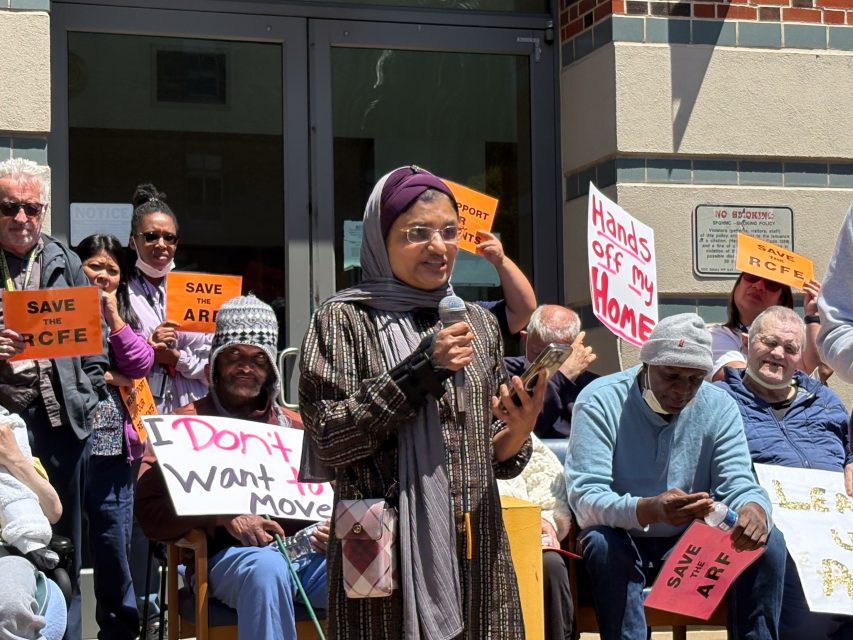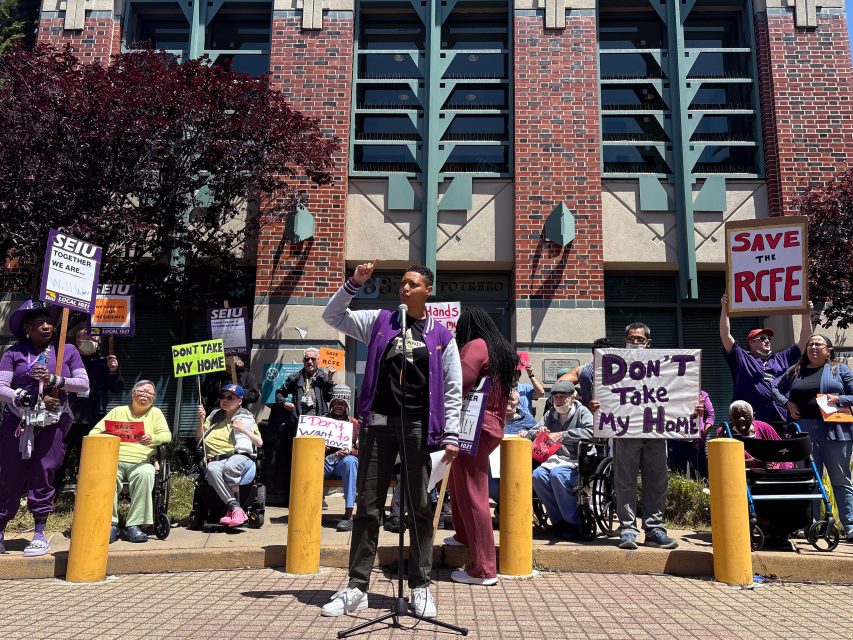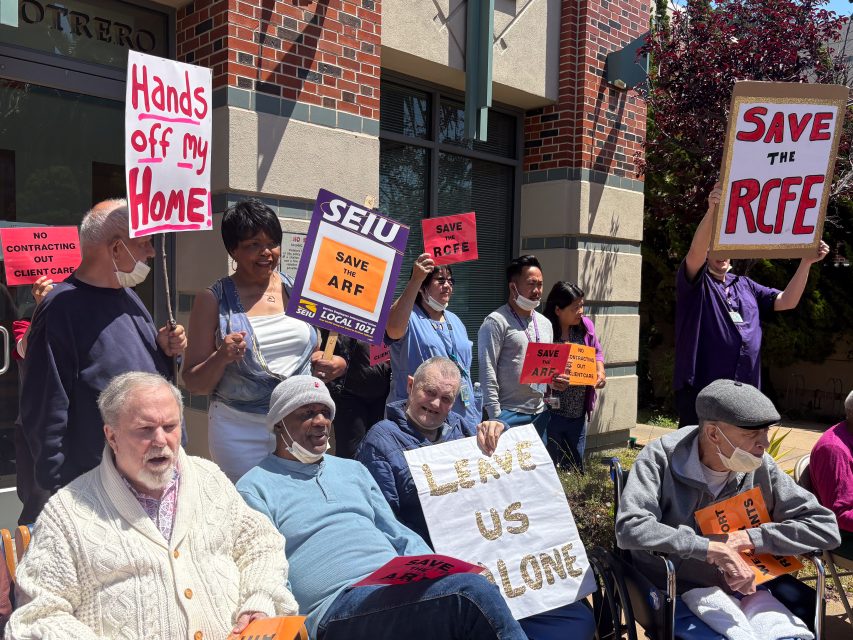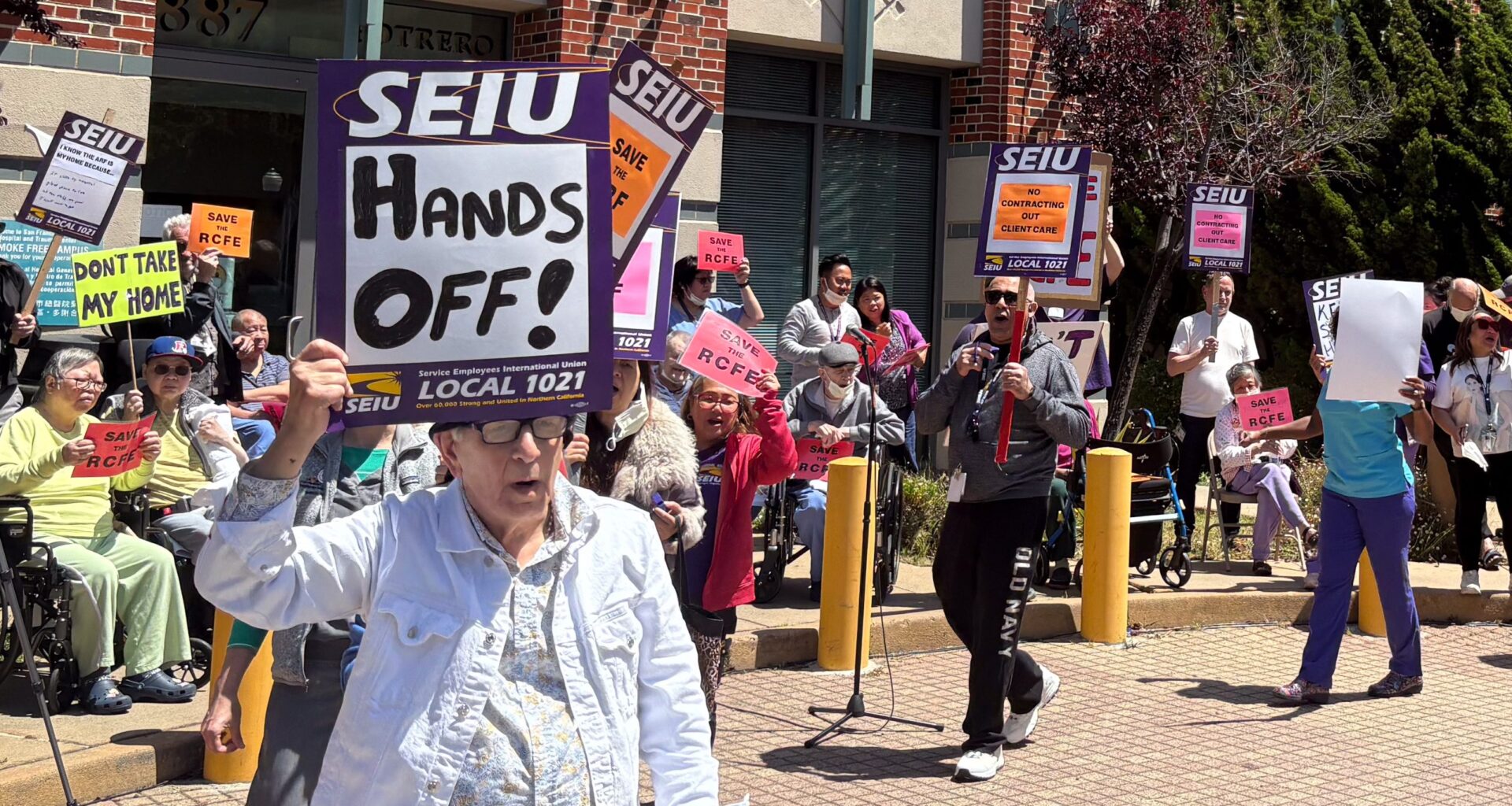Ever since the city announced a plan to move the 83 long-term residents living at its General Hospital’s Behavioral Health Center and repurpose the center as a facility for patients with more severe mental health conditions, Sharifa Rahman has been waking up in the middle of the night, crying at the thought of her patients being pushed out of the front door at 887 Potrero Ave in their wheelchairs.
“We are talking about the most vulnerable people in San Francisco,” said Rahman. Many of the Center’s residents also have chronic mental health conditions. “Even moving from one room to another room is depressing for them. Think about moving them out of this place they call home.”
Rahman, a mental health worker, is known as “the Mother of ARF” (short for the Behavioral Health Center’s Adult Residential Facility). She’s worked there for 24 years. San Francisco’s Department of Public Health plans to move the 83 residents to two facilities on Laguna Street in Hayes Valley.
 Sharifa Rahman speaking at the rally in front of the Behavioral Health Center. Photo by Xueer Lu. June 26, 2025.
Sharifa Rahman speaking at the rally in front of the Behavioral Health Center. Photo by Xueer Lu. June 26, 2025.
According to a flyer issued by the Department of Public Health, the Behavioral Health Center is “an extremely rare asset” because of its architecture — it was built to serve as a locked mental health facility, which makes it easier to separate residents who pose more of a risk to themselves and others.
The city describes this move as a “thoughtful” transition for the 83 residents (the city plans to move them to two of its newly purchased facilities on Laguna Street in Hayes Valley). But the nurses, residents and their families are worried that the move will put the residents at risk by placing them in a new environment with an unknown level of care. Some 70 nurses, residents and family members demonstrated in front of the Behavioral Health Center on a Thursday morning, protesting the city’s decision.

Rahman recalled numerous cases where a client moved out of the center and ended up either passing away at a different facility due to negligent care or winding back up at the Behavioral Health Center. “This is the kind of facility we need more,” Rahman said.
At least four nurses and social workers Mission Local spoke to confirm that the city’s public health department informed them that while there will be no layoffs, the operations at the two new Laguna Street sites will be contracted out which means they will no longer be eligible to work with their clients.
While the Department of Public Health did not fully confirm if the services at the two new sites will be contracted out, it said programs as such “have historically been run by providers with expertise in this type of residential care.”
“Staffing models for the Hayes Valley sites at 601 and 624 Laguna are still being finalized… The reality is that the city does not currently operate Adult Residential Facilities (ARFs) or Residential Care Facilities (RCFEs) in community-based settings,” reads a statement from the department.
“We don’t know what level of care it is going to be. We don’t know what entities they will contract this out to,” said Jennifer Esteen, a psychiatric nurse at the Department of Public Health and the vice president of organizing for SEIU 1021. “At this point, there is no promise to be made.”
 Jennifer Esteen spoke in front of the Behavioral Health Center at a rally. Photo by Xueer Lu. June 26, 2025.
Jennifer Esteen spoke in front of the Behavioral Health Center at a rally. Photo by Xueer Lu. June 26, 2025.
Rahman, for her part, is also skeptical. “Most of the board and care, there is no nursing staff. The requirement is only that you’re a high school graduate or you have a CPR or first-aid certificate,” Rahman said. “But over here, we have LVNs [licensed vocational nurses], site techs, CNAs [certified nursing assistants], and activity leaders.”
“Here, it’s enhanced board-and-care,” Rahman added.
If the city has its way, 45 seniors living on the second floor of the Behavioral Health Center will be moved in late fall of 2025 to 624 Laguna Street, a building the city purchased in August 2024. And 38 adults on the first floor will be moved in late fall of 2026 to 601 Laguna Street, a property the city is in the process of purchasing.
“The Laguna Street properties are better suited to care for BHC [Behavioral Health Center] residents and follow industry standards of community-based facilities,” according to a statement from the Department of Public Health. “Compared to the BHC, Laguna Street will be less clinical, less institutional, and more homelike.”
 Rally in front of the Behavioral Health Center. Photo by Xueer Lu. June 26, 2025.
Rally in front of the Behavioral Health Center. Photo by Xueer Lu. June 26, 2025.
That statement did not sit well with Benson Nadell, a program director at the Felton Institute who runs a long-term care ombudsman program, which is required and authorized by the feds, advocating for residents in long-term care facilities such as board and care homes.
Nadell said his team has visited every licensed care facility in the city and the Behavioral Health Center “has been incredible.”
Compared to a lot of other care facilities, the space at the Behavioral Health Center is “so much wider and expansive than a typical board-and-care home, which has narrow hallways and are very tightly compacted.”
“They tell residents, who feel secure and safe that they finally found a home, that they have to move,” Nadell said. “That’s unacceptable.”
